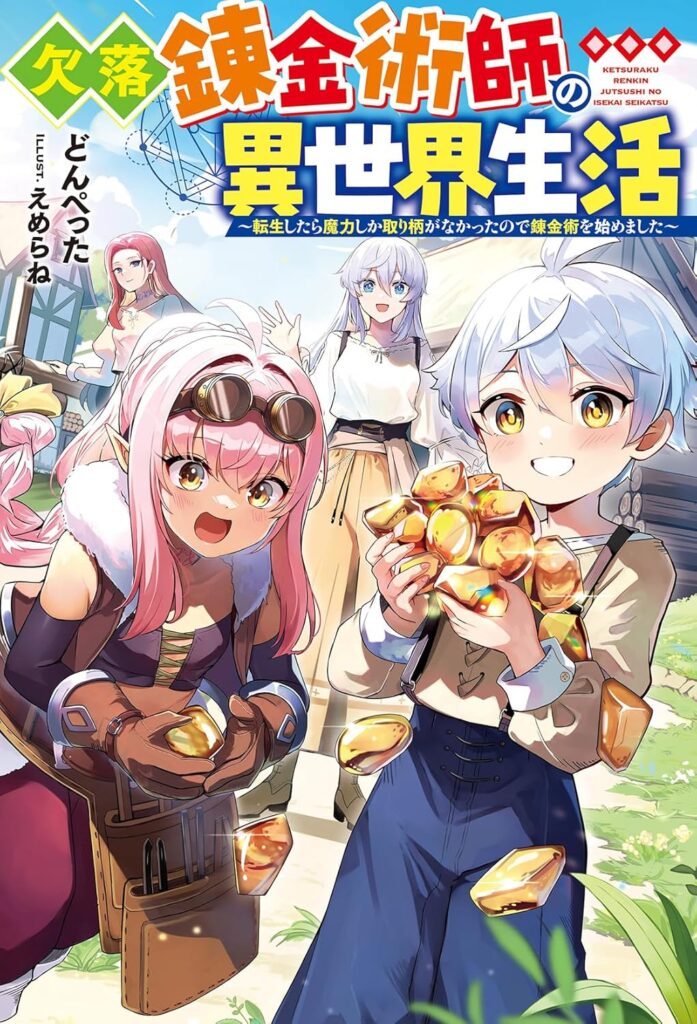
Kays Translations
Just another Isekai Lover~
Chapter 36: Resuming Research on Spider Silk
A month had passed since my injury healed and I resumed combat training. By now, the repairs to the village gate were complete, and Vessel-san had finished the task he had taken on at the request of Rosanne-sama.
In other words, there was no longer any reason for him—or for me—to remain here.
“I have my own work to attend to, so we’ll continue your training another time. Until then, keep practicing what you’ve learned. And for magic training, focus on sensing the flow of magical energy in fine detail,” he instructed.
“Yes, Vessel-san,” I replied, nodding.
Apparently, Vessel-san returned to his homeland once a year to handle requests from his family. He hadn’t shared much about it, but he shrugged it off with a “Can’t be helped,” which made me suspect he had caused some trouble over there as well.
“You two will take care of them while I’m gone,” he added.
“Of course. This time, we’ll protect them,” one of them replied with resolve.
“You can count on us. We won’t let them go through that humiliation again,” said the other.
Even during the spare moments, they continued receiving guidance from Vessel-san. From what I had heard, being taught by an A-rank adventurer required connections, money, and sometimes years of waiting. Under normal circumstances, slaves like them would never have a chance to learn from someone of his caliber—but since they were our bodyguards, Vessel-san had voluntarily taken on the task.
“Tine, don’t overdo it,” he warned gently.
“I know,” she said. Then she added teasingly, “But Vel, you really should take better care of your appearance.”
When we first met Vessel-san, he looked almost suspicious—a wild tangle of hair, a worn and tattered white cloak. It was so bad that Stefana and Rugena had taken it upon themselves to cut his hair and straighten his clothing.
Now, his hair was cut to shoulder length and tied neatly at the back.
Before leaving, Vessel-san lifted me in his arms and whispered, just for my ears, “You did well protecting Tine. I’m proud of you.”
Those words—quiet and sincere—were the most precious I had ever received.
And so, Vessel-san returned to his adventuring work.
After that, our daily routine settled into a rhythm: training in the morning, then dedicating afternoons to study and research.
My studies were twofold: preparing for the entrance exam to the Noble Academy, and researching materials used in alchemy.
To apply to the Noble Academy, I naturally needed to master reading, writing, and arithmetic. Beyond that, I had to study the history of the kingdom and its political systems. The exams were still far off, so I was taking our time, learning a little at a time.
For materials study, I relied on a book of substances Vessel-san had brought me. It wasn’t limited to alchemical materials; it also detailed metals, woods, stones—anything used in crafting.
One entry described a type of tree with characteristics similar to rubber trees. According to the book, this tree didn’t exist within our country, but grew in the neighboring southern kingdom of Volters.
Today, I asked Stefana and Rugena to help resume a research project that had been put on hold.
“You don’t want to go, do you?” I asked cautiously.
“N-No… I can go. It’s fine,” Stefana stammered, her voice trembling.
“I… I’m fine too,” Rugena said softly, her words laced with uncertainty.
Both of them looked as if they might cry. Stefana didn’t even realize she was biting her lip in nervousness. It was heartbreaking to see their hesitation, but there was no one else to ask.
“You don’t need to gather a lot… but I’d like three specimens if possible,” I said carefully.
“Th-three specimens?” Stefana repeated, her eyes widening.
“…Three,” Rugena echoed.
Despite their reluctance, both of them managed to collect the three specimens.
“Alright, I won’t let your effort go to waste. I’ll do my best too,” I told myself.
In the garden, I began dismantling the spiders’ abdomens they had collected, just as I had before, using the tools Rugena had crafted.
The forge had been essential for repairing the gate, so under Rosanne-sama’s instructions, Rugena had been allowed to use it. Now, she worked there several times a week.
“Ugh… it’s disgusting,” Rugena muttered.
“If you think that, you don’t have to watch,” I said.
“I know, but I want to see how what I made is being used,” she replied, watching intently as I dissected the spiders.
Once the dissection was finished, Rugena incinerated the remains, and I ended the task.
“How was it?” I asked.
“…Should the tools be smaller?” she asked, her face pale but attentive.
“They could be, but can you make them any smaller?” I inquired.
“It’ll be difficult, but I’ll try,” she said resolutely.
“Good. Then I’ll leave it to you.”
While Rugena worked on improving the tools, I retreated to my room to study the spider silk secretion.
There were four types of silk, each yielding a different amount. The largest was 300 ml, which I labeled A-silk; next was 120 ml, B-silk; then 90 ml, C-silk; and finally 60 ml, D-silk. Although the yields were lower than last time, it was sufficient for research.
The silk all looked like thick, sticky yogurt, but since they were collected in separate sacs, I was confident they were different types.
I remembered that spider silk came in several types, though I could only discern differences in stickiness. Even I was amazed I was attempting to produce thread from something so elusive.
From previous observations, I knew the silk could solidify or rot. A thin film had formed when left exposed, suggesting it hardened upon drying. As for decay, I had never heard of “rotten spider silk,” and I couldn’t tell whether it occurred in solid or liquid form.
“If I don’t know, I’ll just have to experiment,” I decided.
I began with a small amount of A-silk, extracting moisture alchemically.
“It looks and feels like stone,” I murmured.
Once the water was removed, the silk solidified like a tiny stone. If only it could still be spun into thread… but in this state, it was far too brittle.
Next, I tried shaping it into thin strands while extracting moisture.
“…Fragile,” I muttered.
Even when spun to the thickness of a hair, the strands broke at the slightest touch. Clearly, simply removing moisture wasn’t the solution.
“How does it become thread, then?” I wondered aloud.
Inside the sac, the silk was liquid, but it solidified upon exiting. Perhaps the thread formed at the very exit of the spinnerets.
The spiders were large, so the silk-producing organs were sizable—but still only the size of a pinky finger. Dissecting them would be painstaking work.
At this scale, I needed a magnifying glass.
I pulled out a glass ingot and used alchemy to craft a convex lens. Then, I carved wood for the frame, support, and base, creating a tabletop magnifying glass.
“…Will this be enough?” I questioned.
Even with high-magnification lenses, it was no microscope. The magnification reached at most twenty times—insufficient for microscopic observation. A proper microscope required prisms, which I could not yet produce due to precision limits in my alchemy. For now, I would have to work with what I could see.
The spinnerets looked like tiny bovine teats, four in a row. I dubbed them “silk-extruding organs” for clarity. The central concave part hid their internal structure.
I carefully bisected one vertically.
“Whoa… so that’s how it works,” I breathed.
Inside, silk remnants remained, and the concave region held traces of white silk. Even through the magnifying glass, the structures were visible.
It appeared the silk did not emerge from the center, but from much smaller hair-like organs surrounding the concavity. These fine structures secreted and twisted the silk into thread.
In other words, what we perceived as a single thread was actually a combination of finer threads twisted together.
“…This is way too intricate to replicate the spinneret accurately,” I muttered, staring at the impossibly delicate machinery of nature.
